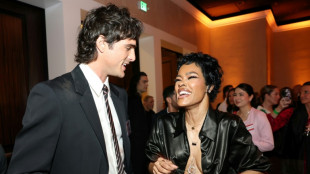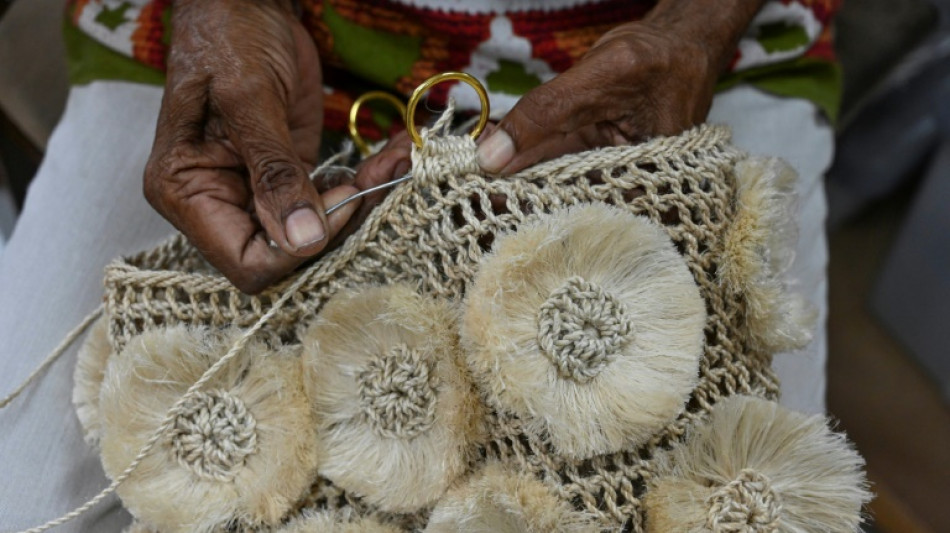
-
 Dutch speed skater Jutta Leerdam combines Olympic gold and influencer attitude
Dutch speed skater Jutta Leerdam combines Olympic gold and influencer attitude
-
Scotland coach Townsend under pressure as England await

-
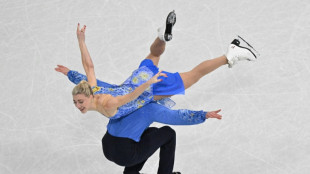 Canadian ice dancers put 'dark times' behind with Olympic medal
Canadian ice dancers put 'dark times' behind with Olympic medal
-
'Exhausting' off-field issues hang over Wales before France clash

-
 Crusaders target another title as Super Rugby aims to speed up
Crusaders target another title as Super Rugby aims to speed up
-
Chinese Olympic snowboarder avoids serious injury after nasty crash

-
 China carbon emissions 'flat or falling' in 2025: analysis
China carbon emissions 'flat or falling' in 2025: analysis
-
'China shock': Germany struggles as key market turns business rival

-
 French ice dancer Cizeron's 'quest for perfection' reaps second Olympic gold
French ice dancer Cizeron's 'quest for perfection' reaps second Olympic gold
-
Most Asia markets rise as traders welcome US jobs
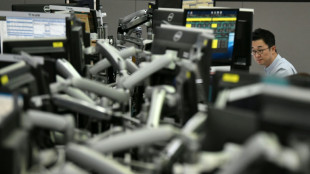
-
 EU leaders push to rescue European economy challenged by China, US
EU leaders push to rescue European economy challenged by China, US
-
Plenty of peaks, but skiing yet to take off in Central Asia

-
 UN aid relief a potential opening for Trump-Kim talks, say analysts
UN aid relief a potential opening for Trump-Kim talks, say analysts
-
Berlin Film Festival to open with a rallying cry 'to defend artistic freedom'
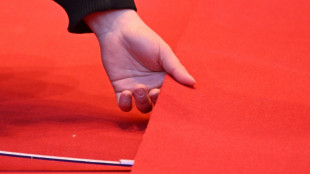
-
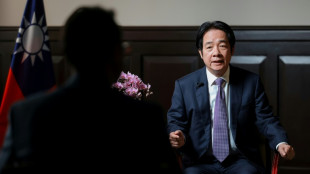 Taiwan leader wants greater defence cooperation with Europe: AFP interview
Taiwan leader wants greater defence cooperation with Europe: AFP interview
-
Taiwan leader warns countries in region 'next' in case of China attack: AFP interview
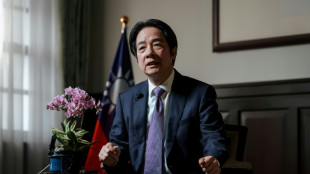
-
 World Cup ticket prices skyrocket on FIFA re-sale site
World Cup ticket prices skyrocket on FIFA re-sale site
-
'No one to back us': Arab bus drivers in Israel grapple with racist attacks

-
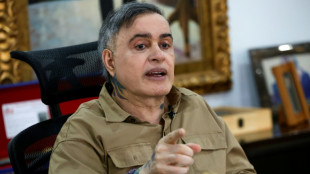 Venezuelan AG wants amnesty for toppled leader Maduro
Venezuelan AG wants amnesty for toppled leader Maduro
-
Scrutiny over US claim that Mexican drone invasion prompted airport closure

-
 Trump to undo legal basis for US climate rules
Trump to undo legal basis for US climate rules
-
Protesters, police clash at protest over Milei labor reform

-
 Dyche sacked by Forest after dismal Wolves draw
Dyche sacked by Forest after dismal Wolves draw
-
France seeks probe after diplomat cited in Epstein files

-
 Rivers among 2026 finalists for Basketball Hall of Fame
Rivers among 2026 finalists for Basketball Hall of Fame
-
Israel president says antisemitism in Australia 'frightening'

-
 Trump orders Pentagon to buy coal-fired electricity
Trump orders Pentagon to buy coal-fired electricity
-
Slot hails 'unbelievable' Salah after matching Liverpool assist record

-
 Von Allmen joins Olympic ski greats, French couple win remarkable ice dance
Von Allmen joins Olympic ski greats, French couple win remarkable ice dance
-
Guardiola eyes rest for 'exhausted' City stars

-
 US pushes for 'dramatic increase' in Venezuela oil output
US pushes for 'dramatic increase' in Venezuela oil output
-
France's Cizeron and Fournier Beaudry snatch Olympic ice dancing gold

-
 Man City close on Arsenal, Liverpool end Sunderland's unbeaten home run
Man City close on Arsenal, Liverpool end Sunderland's unbeaten home run
-
Van Dijk sinks Sunderland to boost Liverpool's bid for Champions League

-
 Messi out with hamstring strain as Puerto Rico match delayed
Messi out with hamstring strain as Puerto Rico match delayed
-
Kane helps Bayern past Leipzig into German Cup semis

-
 Matarazzo's Real Sociedad beat Athletic in Copa semi first leg
Matarazzo's Real Sociedad beat Athletic in Copa semi first leg
-
Arsenal stroll in Women's Champions League play-offs

-
 Milei labor law reforms spark clashes in Buenos Aires
Milei labor law reforms spark clashes in Buenos Aires
-
Bangladesh's political crossroads: an election guide

-
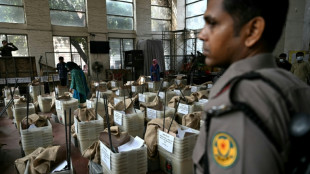 Bangladesh votes in landmark polls after deadly uprising
Bangladesh votes in landmark polls after deadly uprising
-
US stocks move sideways after January job growth tops estimates
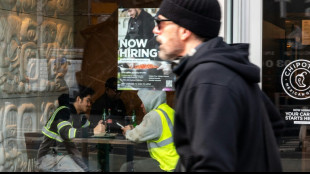
-
 Man City close in on Arsenal with Fulham cruise
Man City close in on Arsenal with Fulham cruise
-
Mike Tyson, healthy eating advocate for Trump administration
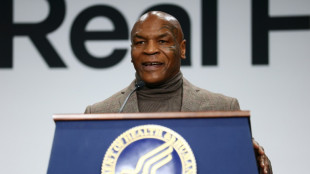
-
 LA 2028 Olympics backs chief Wasserman amid Epstein uproar
LA 2028 Olympics backs chief Wasserman amid Epstein uproar
-
Brighton's Milner equals Premier League appearance record

-
 Seahawks celebrate Super Bowl win with title parade
Seahawks celebrate Super Bowl win with title parade
-
James Van Der Beek, star of 'Dawson's Creek,' dies at 48

-
 Scotty James tops Olympic halfpipe qualifiers as he chases elusive gold
Scotty James tops Olympic halfpipe qualifiers as he chases elusive gold
-
Swiatek, Rybakina fight back to reach Qatar Open quarter-finals


Papua New Guinea women weave their way to a living
Inside a compound in Papua New Guinea's capital, Betty Nabi is putting six decades of expertise to work, weaving traditional bags that can last a lifetime.
The boutique workshop in Port Moresby hosts a group of women who specialise in intricately lacing plant fibres together to make the roomy pouches known as bilums, a symbol of Indigenous pride.
The word bilum means "womb" in the local Tok Pisin language, and the women are giving the functional handwoven bags new life -- bringing them to an international audience in return for a steady wage in a country where about 40 percent live below the poverty line.
"You can put everything inside," said Nabi, a 70-year-old weaver at Bilum & Bilas, who earns a monthly paycheck of 1,000 Kina ($285), around 50 percent more than the country's minimum wage.
"Go to the store, put the kaikai (food) inside. The big one, you can put the baby."
Bilums can take weeks to make, and are dyed using colours unique to the maker's heritage.
Nabi and the three other weavers each craft up to five bilums a month, attracting customers as far away as Iceland.
- 'Makes us proud' -
Demand is growing, with international customers in North America, Europe and neighbouring Australia increasingly looking for authentic bilums, says supervisor Maureen Charlie, 34.
The bags have also drawn attention from the fashion world, with coverage of the patterned pouches and the techniques used to make them landing in top magazines such as Grazia, Harper's Bazaar and Vogue Australia.
Some are concerned the bag that serves as a pillar of Papua New Guinea culture is being misappropriated by Westerners for fashion and profit.
But the weavers say they have little issue with its export.
"It makes us proud, like, 'Oh yeah, there's something from PNG there'," said Charlie.
"It's special. It's part of who we are and it's part of our culture. We are still doing it, and my children will be doing it."
Bilums are often given to friends and family, or used in welcome rituals, sometimes being laid on the floor in front of guests.
But the women are capitalising on their increasing popularity to stitch together a living for their families and other weavers.
"In villages, women don't have any source of income. Sometimes they don't have time to come to the markets, or road access, so they just weave and store their bilums," said Charlie.
- 'Anytime, forever' -
At the lower end of the market, women in Port Moresby take their wares to stalls in shanty towns, risking the theft of stock in high-crime areas.
"It's a good income for my family. I make bilum and get income to sustain my daily living," said independent weaver Cathy Wariapa, 35, who sells her bags every weekend at a safer spot inside the grounds of a hotel.
"Sometimes we don't sell. When there are no buyers, we just take them back."
The bags are usually made and worn by women like Charlie, but Papua New Guinean men are increasingly donning them as pouches around their neck.
"If a woman doesn't wear a bilum... they say you're not a woman," said Charlie.
"When I carry a bilum, I feel like I'm a woman and I'm from Papua New Guinea."
So weaving the bags handed down to them by their mothers and grandmothers is about more than money.
"We can make bilum anytime, forever," said Betty Nabi.
"We will not stop."
H.Jarrar--SF-PST




